Newborn Kitten Care: Essential Care Tips
Article
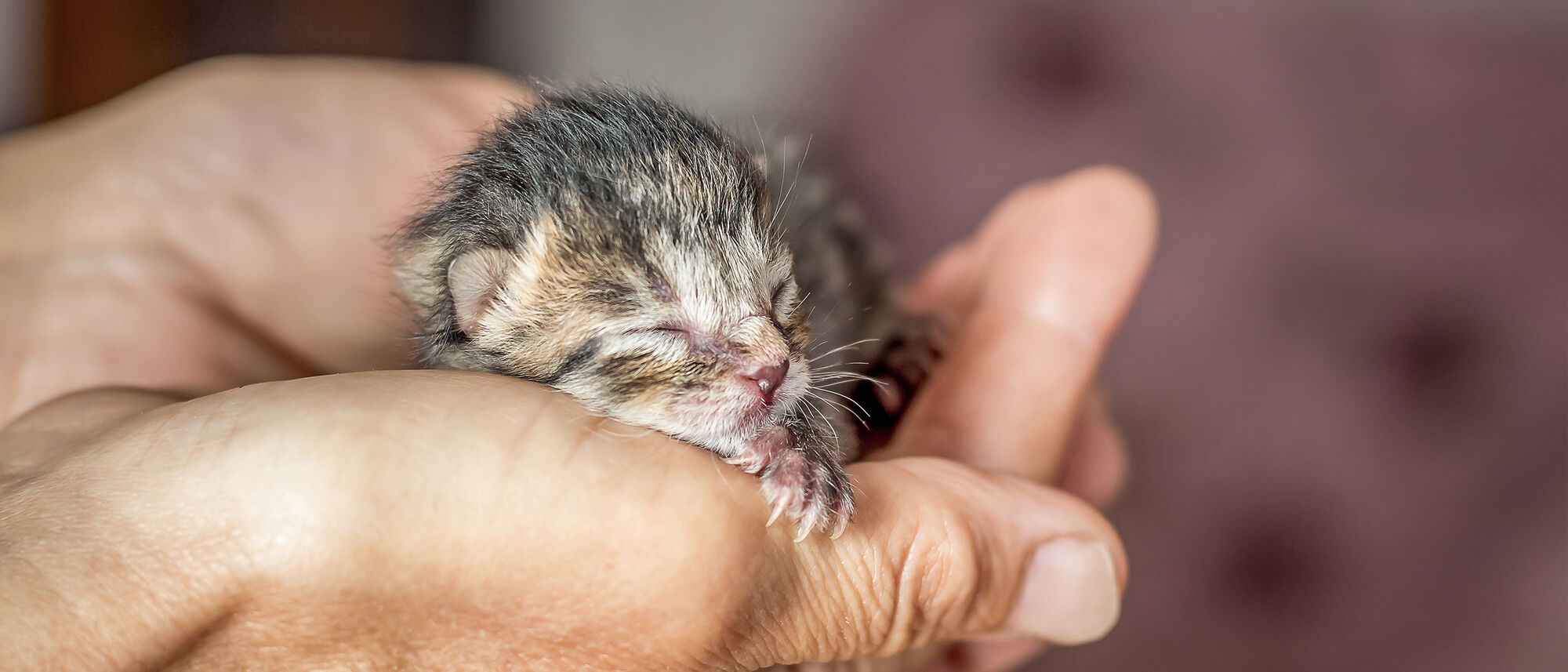
Cats are very prolific breeders and as such many kitten litters are unplanned. Helping a pregnant cat give birth can be a technical process, however, and requires a lot of skill. That's why it’s important that you speak to your vet if you suspect that your cat is gestating. They will provide recommendations and guidance on how to support your cat through their pregnancy and labour.
In this article, we’ll outline a few of the actions you can take to ensure you give any newborn litter of kittens the care they need.
What do you need to do for newborn kittens?
Identify each kitten
You’ll need to monitor each kitten individually. A simple way to ensure you recognise them is to create collars using different colours of wool for each kitten. Remember to change these for bigger collars as they grow.
Weigh the kitten
The growth rate between birth and two days old is an important health indicator in neonatal kitten care, so it’s important to record a kitten’s birth weight, followed by daily recordings of their weight to track their progress. Use digital scales to take accurate measurements within 1g and make sure they’re clean and disinfected. Healthy kittens should double their birth weight in the first two weeks, then continue to gain weight healthy.
Examine from head to tail
Keep a close eye on the development of each kitten. If they aren’t gaining weight, if you are concerned about any potential abnormalities, or if you believe something is wrong with a kitten or kittens, make sure that you seek immediate advice from your vet.
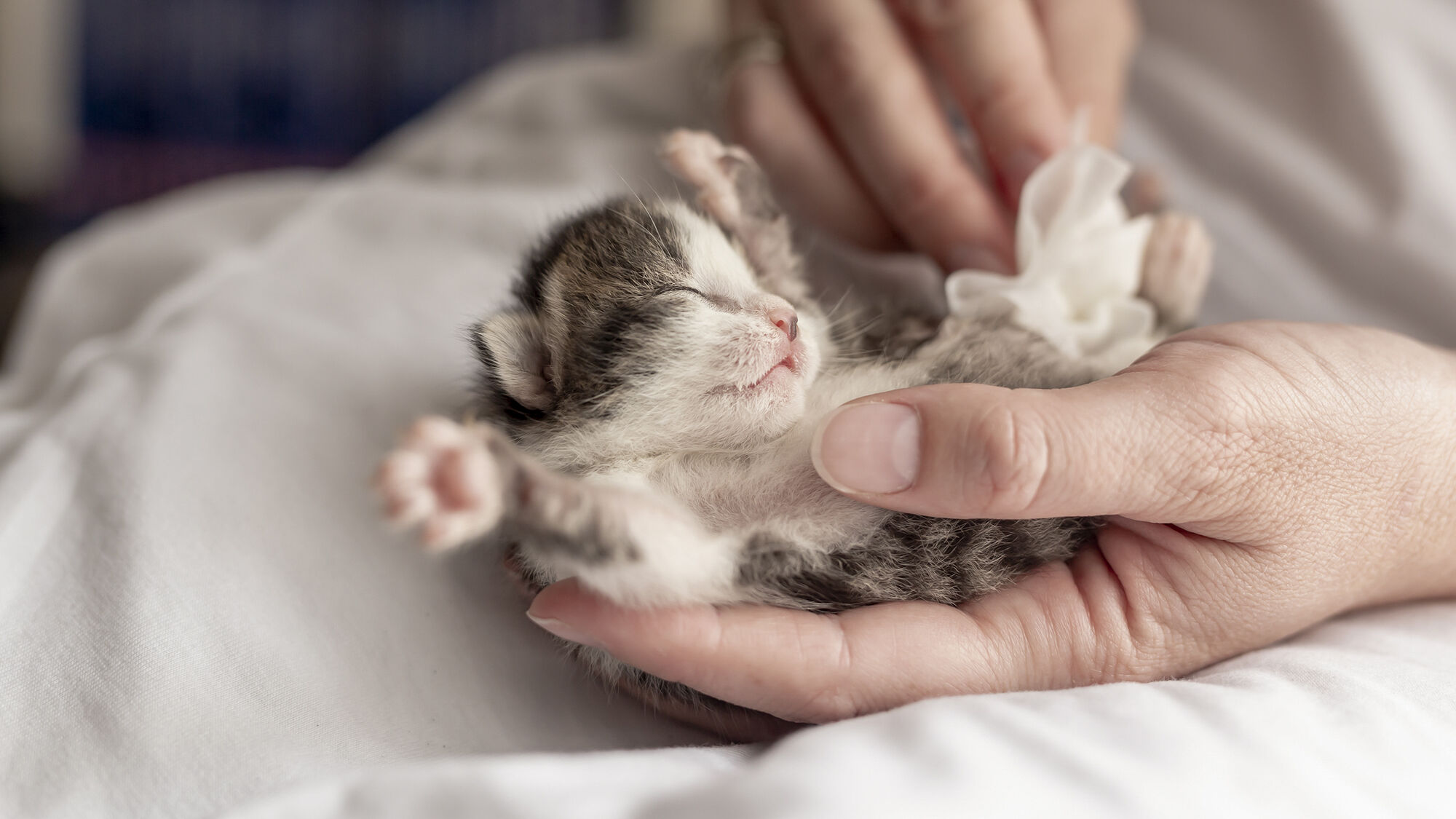
Determine the sex of the kittens
Sexing kittens is not always easy, and even professional breeders can struggle in the first hours, but there are two key indicators to look out for:
- In female kittens, the area separating the anus and the vulva is devoid of hair and is very short (around 5mm)
- In male kittens, the zone separating the anus and the prepuce is around 1 cm long.
How do kittens develop in the first 24 hours?
Feeding
Although newborn kittens are born without sight and can’t stand, within the first hours they’ll begin to crawl to the mother’s teats. There’s usually some competition among siblings and they’ll each choose a nipple they prefer to suckle from within the first three days. Make sure all the kittens are suckling regularly to get the nutrients they need to grow.
If your cat is struggling to feed her kittens, or the kittens don’t seem to be receiving enough milk, you may be required to support them with a kitten milk substitutes. Formulas such as Royal Canin Babycat milk are specially developed to provide all the important nutrients to support newborn kittens.
Growth
Even by one day old a kitten should have begun to grow. Healthy kittens must gain weight on a daily basis. If they don’t gain weight, or if they lose weight in the first few days, they should be checked by a vet to make sure there’s no underlying illness.
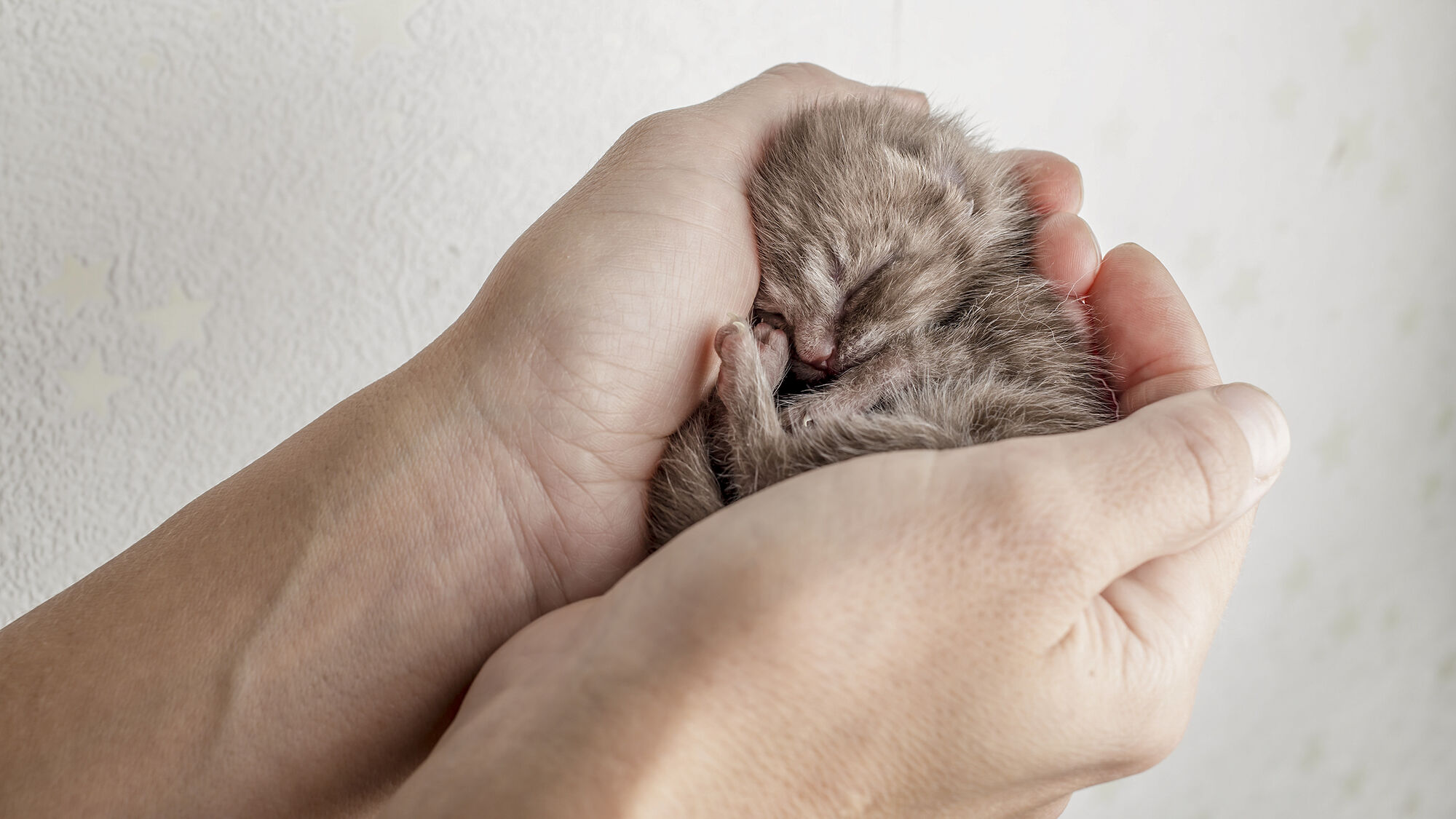
What should a mother cat do after birth?
The mother cat should stay with her kittens and begin licking them. This not only cleans them and provides comfort; it encourages them to suckle and stimulates them to defecate and urinate.
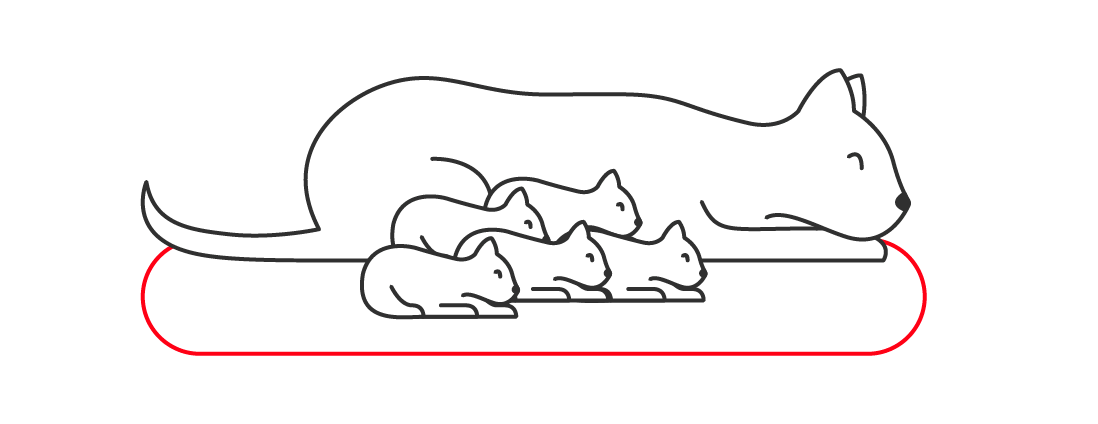
What if the mother can’t feed her kittens sufficiently?
There are various reasons why this might happen – for example when:
- It’s a large litter.
- The mother has mastitis.
- The mother has a behavioural disorder.
- Kittens are orphaned during birth.
- There is a known risk of blood group incompatibility.
Signs that a kitten isn’t getting enough milk are:
- No weight gain during the first two days.
- Constant crying.
Always consult your vet if you believe that the mother isn’t feeding her kittens sufficiently.
What to feed a newborn kitten
If the mother isn’t providing colostrum within the first few hours of birth, you may need to step in to ensure the kittens are being fed. The first 24 hours after birth are the optimum time to absorb the nourishment and antibodies provided by colostrum. If you believe this is the case, it’s important to discuss the options with your vet.
How to feed a newborn kitten
If you need to begin bottle-feeding a newborn kitten there are some important things to remember.
- Always use kitten milk formula - never give cow’s milk, goat’s milk, human baby formula or dairy alternatives. They don’t provide the nutrients a kitten need and may upset their stomach.
- For newborns suckling properly, a kitten bottle with the right sized teat is the safest way to feed. A syringe may be better for some kittens under 10 days old.
- Make sure the kitten is in an upright position and not on their back while feeding.
- Feed very slowly, one drop at a time, to avoid the risk of the kitten breathing in the fluid.
- Take great care with hygiene. Keep hands and feeding equipment scrupulously clean. Make a fresh portion for each feed, discarding any unused milk afterwards.
- After bottle feeding, it’s vital to stimulate the kitten’s rear to encourage them to defecate and urinate. Use cotton wool soaked in warm water.
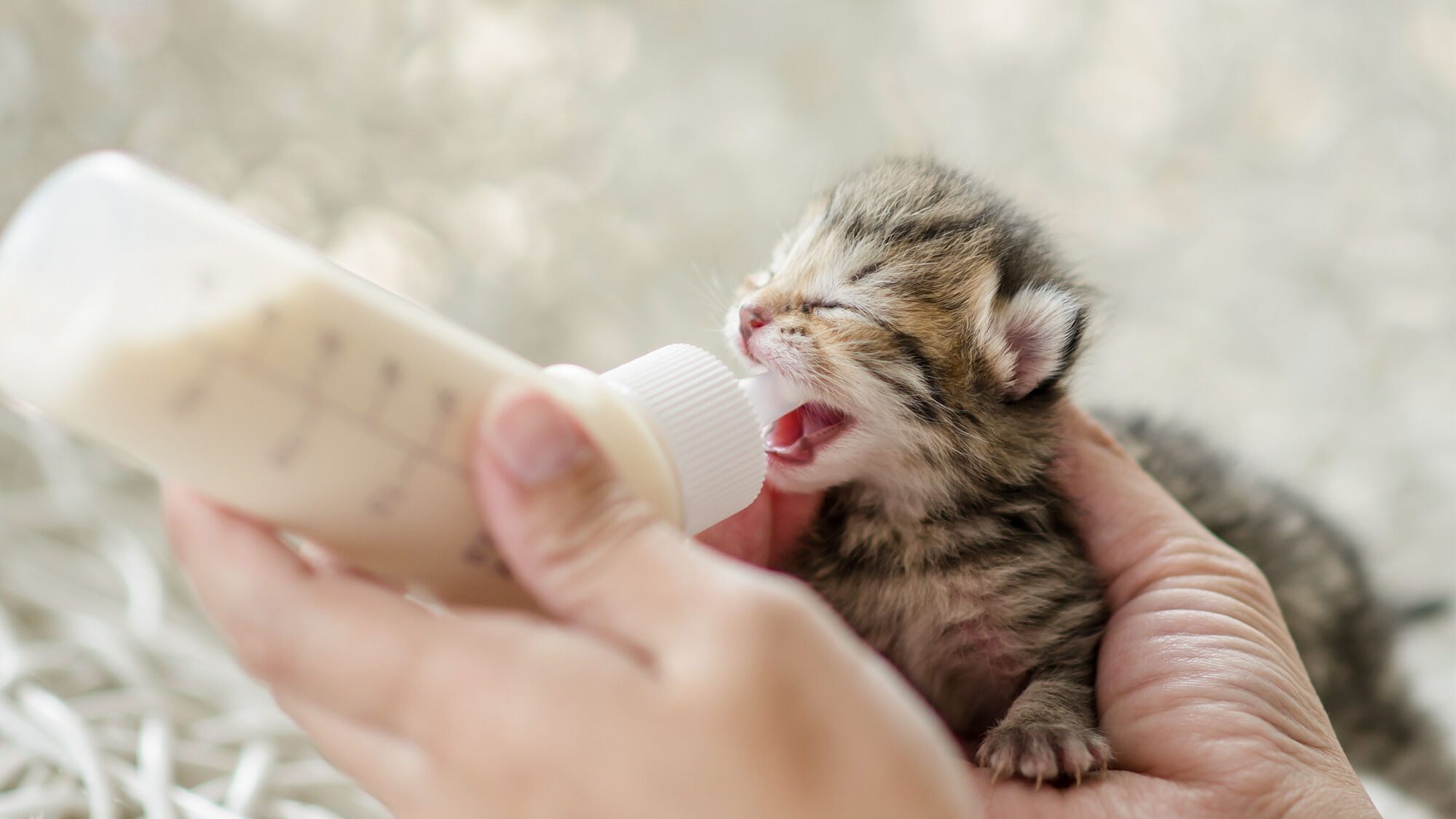
Health issues to look out for in baby kittens
Hypoglycaemia, hypothermia & dehydration
If a kitten appears weak and lethargic and is twitching or trembling, it may be hypoglycaemic. Causes of this can include poor nutrition and infection. Hypoglycaemia often leads to hypothermia, which makes it difficult for kittens to suckle and can lead to dehydration, and can quickly result in death. It’s important, therefore, to keep a close check on newborns and ensure they’re warm enough, have a healthy body temperature and are suckling well.
Incompatible blood groups
Neonatal isoerythrolysis can affect newborn kittens after suckling colostrum. It’s caused by them having a different blood group from their mother, and their red blood cells being destroyed by antibodies in the colostrum. Symptoms can range from haemorrhaging and death to anaemia, weight loss and weakness. Professional breeders select their stud cat and queen after completing a number of tests to be sure they are not incompatible.
Toxic milk syndrome
This bacterial infection is caused by kittens suckling from an infected mammary gland (a condition known as mastitis). Watch for inflammation of one or more teats and weakening or lack of growth in the kitten. The milk may also be yellow-green or red-brown and the kitten may cry or have digestive difficulties.
Diarrhoea
Diarrhoea is a serious condition. It may be caused by over–feeding, giving too concentrated a solution of milk replacer, or result from an infection (usually caused by poor hygiene). If your kittens are experiencing diarrhoea, they should be taken to see a vet. Treatment must be swift as dehydration can then develop very rapidly.

When to contact your vet
Kittens are most vulnerable in the first few hours and days, so it’s highly recommended to have a vet visit. If you feel something’s not right with a newborn, always contact your vet. Whether you’re concerned about their breathing, feeding, a potential abnormality, an infection or something else, you will need an expert opinion.
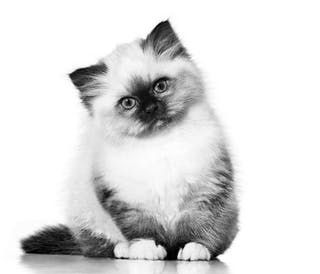
A healthy start to life
Kittenhood is a time of huge physical and behavioural change, and a steep learning curve for new owners. Find out how you can provide your kitten with the best start in life so they develop into strong, healthy cats.
Tailored nutrition for your kitten
Nutritional formulas that help to build your kitten's natural defences, support healthy growth, and aid in digestive system development.
Like & share this page